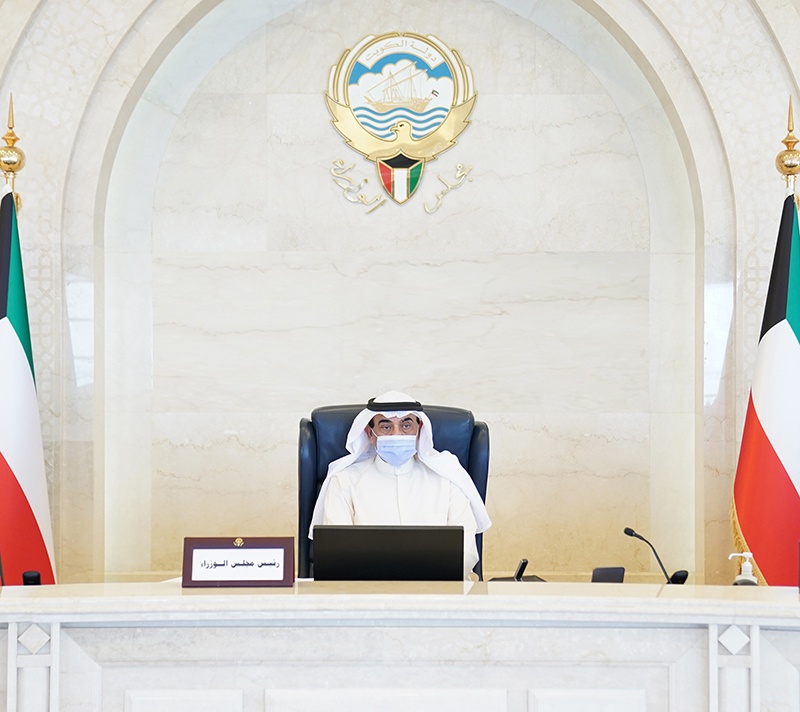 KUWAIT: His Highness the Prime Minister Sheikh Sabah Al-Khaled Al-Sabah chairs a Cabinet meeting. — KUNA
KUWAIT: His Highness the Prime Minister Sheikh Sabah Al-Khaled Al-Sabah chairs a Cabinet meeting. — KUNA
KUWAIT: The following is a report on major events related to the Cabinet throughout 2021:
Jan 11: The Cabinet allowed entry of domestic workers, requiring them to bring PCR certificates showing negative coronavirus tests.
Jan 12: His Highness the Prime Minister Sheikh Sabah Al-Khaled Al-Hamad Al-Sabah received the Cabinet’s resignation from Deputy Prime Minister and Minister of Defense Sheikh Hamad Jaber Al-Ali Al-Sabah.
Jan 13: His Highness the Prime Minister Sheikh Sabah Al-Khaled Al-Hamad Al-Sabah submitted the Cabinet’s resignation to His Highness the Amir.
Jan 24: His Highness Sheikh Sabah Al-Khaled, re-appointed as Kuwait’s Prime Minister, stressed enhancing the relationship between the government and the National Assembly to achieve the desired goals.
Jan 25: The Cabinet approved the state budget for the fiscal year 2021-2022 with approximate expenditure amounting to KD 23.048 billion and projected income at KD 10.929 billion.
Jan 27: His Highness Sheikh Sabah Al-Khaled stated while meeting with editors-in-chief of local newspapers that the government has referred to the Public Prosecution 122 cases of misappropriation of public funds, 1,691 cases encroachment on state property and 282 cases of trading in expatriates’ residencies.
Jan 27: His Highness the Prime Minister Sheikh Sabah Al-Khaled Al-Hamad Al-Sabah stated while meeting with editors-in-chief of local newspapers, that up to 35,000 citizens and residents got vaccinated against COVID-19. He said shipments of vaccines have stopped around the world because suppliers are re-examining the needs.
Feb 3: The Cabinet ordered closure of all trade facilities, except pharmacies and food supplying outlets from 8:00 pm to 5:00 am starting February 7.
Feb 3: The Kuwaiti government ordered a full shutdown of gyms, resorts, beauty salons, also banning gathering halls and tents starting February 7.
Feb 3: The Cabinet imposed a two-week ban on entry of non-Kuwaitis to the country, except foreigners who are first-degree relatives of Kuwaitis and domestic workers starting from February 7.
Feb 3: The national fund for supporting small and medium-sized enterprises postponed instalments on borrowers in a bid to alleviate hardships caused by COVID-19.
Feb 16: Kuwaiti Cabinet allowed resumption of sport activities.
Feb 16: The Cabinet approved increasing financial incentives for business owners who faced suspension due to COVID-19.
March 2: A new 15-member cabinet is formed, with the inception of State Ministry for integrity (Nazaha) affairs and State Ministry for Communication and Information Technology.
March 4: Cabinet imposes a 12-hour (5:00 pm to 5:00 am) curfew from March 7 to April 4.
March 8: Cabinet approves a draft decree appointing Ambassador Majdy Al-Dhifeeri as deputy foreign minister.
March 15: Cabinet approves a draft law to finance local banks and those financially impacted by COVID-19.
March 15: Cabinet approves a draft decree appointing Wael Al-Asoussi as Council of Ministers’ Secretary General.
March 29: Cabinet opens a KD 600 million account to cover frontline rewards. It also approved designating the southern island on Jaber Causeway as a drive-thru vaccination center.
April 1: Kuwait extended the night curfew until April 22 from 7:00 pm until 5:00 am in an effort to limit the spread of COVID-19. However, Pharmacies, grocery stores, and essential services remained open during curfew hours.
April 12: The government decided during a meeting the following: Allow male worshippers to perform the Taraweeh (late night) prayers for 15 minutes. Mosques must close following each prayer, while lectures and other activities in mosques are banned. Iftar (fast-breaking) and suhur (pre-dawn) meals are banned in mosques and public places. Distributing charity meals without causing gathering is allowed. People who did not get COVID-19 vaccination are to pray at home as a precaution. Approve health authorities’ request on using the help of a fourth group of Pakistani medical workers to help fight COVID-19.
April 19: The government extended the curfew which was imposed on April 22 until the end of Ramadan.
April 26: The Cabinet approved the draft law of the penal code 16/1960 stipulating imprisonment and financial penalties on any person who may threaten to damage individuals’ reputation or his financial resources.
April 26: The Cabinet agreed to join an Arab treaty concerning transfer and transplant of human organs and barring trade in these organs.
April 26: The Cabinet approved a draft law of a technical education accord between Kuwait and Sierra Leone, and a cooperation agreement with Indonesia in higher education studies and scientific research.
April 26: The Cabinet decided to send oxygen supplies and relief items to India.
May 10: Kuwait’s Cabinet decided the following: Partial curfew imposed nationwide to combat the spread of COVID-19 to be lifted on the first day of Eid Al-Fitr. All commercial establishments to be closed from 8:00 pm until 5:00 am, whereas pharmacies, supermarkets, healthcare providers, restaurants, cafes and maintenance services are excluded from the decision. Cinemas and theaters are opened in Eid Al-Fitr only for vaccinated people. Restaurants and cafes are allowed to receive takeaway orders only. Employee’s attendance should not exceed 60 percent of total workers.
May 18: The Cabinet allowed restaurants and cafes to receive people for dine-in with the implementing of health precautions.
May 18: The Cabinet appointed Maryam Al-Aqeel as head of the Civil Services Commission (CSC).
May 18: The Kuwaiti Cabinet approved urgent relief aid to Palestinians in Gaza who had been attacked by the Zionist entity’s occupation forces.
June 7: The Cabinet decided to resume direct flight to the United Kingdom as of June 13, as well as to reopen museums and cultural institutions and facilities.
June 7: The Cabinet approved a draft law on state budget for fiscal year 2020-2021 with an additional appropriation of KD 600 million for front line workers.
.jpg)



